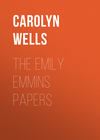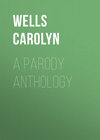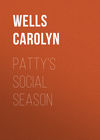Читать книгу: «Raspberry Jam», страница 6
“No; of course not. Do whatever is right, Mason. I’m so glad to have you here, it takes a load of responsibility off of me. You’re a tower of strength.”
“Then do what you can to help me, Eunice. Try, won’t you, to be quiet and calm. Don’t get so wrought up over these things that are unpleasant but unavoidable. I don’t underrate your grief or your peculiarly hard position. The nervous shock is enough to make you ill—but try to control yourself—that’s a goody girl.”
“I will, Mason. Honest I will.”
Soon after noon Hendricks arrived. He had returned from Boston on an early morning train, and hearing of the tragedy, came at once to the Embury home.
At sight of his grave, sympathetic face, Eunice burst into tears, the first she had been able to shed, and they were a real relief to her overburdened heart.
“Oh, Alvord,” she cried, hysterically, “now you can be president!”
“Hush, hush, Eunice, dear,” he soothed her; “don’t let’s speak of that now. I’m just in from Boston—I hurried over as soon as I heard. Tell me, somebody—not you, Eunice—you tell me, Aunt Abby, how it happened.”
“That’s the strange part,” said Elliott, who was sitting at the telephone, and was, at the moment, waiting for a response to a call, “the doctors can’t tell what ailed Sanford!”
“What! Can’t tell what made him die!”
“No;” Aunt Abby took up the tale, as Elliott turned back to the telephone; “and I think it’s very queer. Did you ever know a man to die, Alvord, and nobody be able to tell what killed him?”
“I certainly never did! What had he eaten?”
“Oh, it’s nothing like that,” Eunice spoke up; “it must be that something gave way—his heart, or lungs—”
“Never! Sanford was a sound as a dollar!”
“That’s what Dr. Harper says. They’re—they’re going to have an autopsy.”
“Of course. We’d never be satisfied without that. They’ll find the cause that way, of course. Dear Eunice, I’m so sorry for you.”
“It’s awful for Eunice,” said Aunt Abby “the excitement and the mystery—oh, Alvord, do let me tell you what I saw!”
“What?” he asked, with interest.
“Why, it was almost dawn—just beginning to be daylight, and, you know—Dr. Harper says Sanford died about daybreak—he thinks—and I was sort of between asleep and awake—don’t you know how you are like that sometimes—”
“Yes.”
“And I saw—”
“Aunt Abby, if you’re going to tell that yarn over again, I’ll go away! I can’t stand it!”
“Go on, Eunice,” and Aunt Abby spoke gently. “I wish you would go to your room and lie down for awhile. Even if you don’t want to, it will rest your nerves.”
To her surprise, Eunice rose and without a word went to her own room.
Aunt Abby sent Maggie to look after her, and resumed her story.
“I’m going to tell you, Alvord, for I must tell somebody, and Eunice won’t listen, and Mason is busy telephoning—he’s been at it all day—off and on—”
“Fire away, Aunt Abby, dear,” Hendricks said. He had small desire to hear her meandering tales, but he felt sorry for the pathetic face she showed and listened out of sheer charity.
“Yes, it was near dawn, and I was sort of dozing but yet, awake, too—and I heard a step—no, not a step, just a sort of gliding footfall, like a person shufing in slippers.
“And then, I saw a vague shadowy shape—like Sanford’s—and it passed slowly through the room—not stepping, more like floating—and it stopped right at my bedside, and leaned over me—”
“You saw this!”
“Well, it was so dark, I can’t say I saw it—but I was—I don’t know how to describe it—I was conscious of its presence, that’s all!”
“And you think it was Sanford’s ghost?”
“Don’t put it that way, Al. It was Sanford’s spirit, leaving the earth, and bidding me good-by as it wafted past.”
“Why didn’t he bid his wife good-by?” Hendricks was blunt, but he deemed it best to speak thus, rather than to encourage the ghost talk.
“He probably tried to, but Eunice must have been asleep. I don’t know as to that—but, you know, Alvord, it is not an uncommon thing for such experiences to happen—why, there are thousands of authenticated cases—”
“Authenticated fiddlesticks!”
“Your scorn doesn’t alter the truth. I saw him, I tell you, and it was not a dream, or my imagination. I really saw him, though dimly.”
“What did he have on?”
“That’s the queer part. Not his usual clothes, but that sort of a jersey he wears when he’s doing his exercise.”
“Oh, his gym suit? You saw it plainly?”
“Not so very plainly—but—I felt it!”
“Felt it! What are you talking about?”
“I did, I tell you. He leaned over me, and I put out my hand and touched his arm, and I—I think I felt a tight woolen jersey sleeve.”
“Oh, you think you did! Well, that’s all right, then, but you mustn’t say you felt a ghost. They’re not material, you know.”
“You’re making fun of me, Alvord, but you mustn’t. I know more about these things than you do. Why shouldn’t I? I’ve made a study of them—I’ve read lots of books, and been to lots of séances, and lectures—oh, I know it was a manifestation of San himself!”
“Well, Aunt Abby, if it gives you any comfort to think it was, why, just keep right on thinking. I don’t say there aren’t such happenings. I only say I don’t believe there are. I don’t doubt your word, you understand, but I can’t make my hard common sense take it in. My mind isn’t built that way. Did you hear anything?”
“I heard—” Aunt Abby paused, and blushed a little—”you’ll laugh, I know, but I heard—his watch ticking!”
“Oh, come now, Aunt Abby, that’s a little too much! I can’t help smiling at that! For I’m sure ghosts don’t carry watches, and anyway not in a gymnasium suit!”
“I knew you’d jeer at it, but I did hear the ticking, all the same.”
“Wasn’t your own watch under your pillow?”
“Yes.”
“Oh, all right. I haven’t a word to say.”
“But it wasn’t any watch I heard—it was a different sort of tick.”
“Yes, of course it was. Ghosts’ watches have a peculiar tick of their own—”
“Alvord, stop! It’s mean of you to poke fun at me!”
“Forgive me, do; I apologize. It was mean, and I’ll stop. What else happened?”
“Nothing,” Aunt Abby was clearly piqued.
“Yes, tell me. What became of the—the figure?”
“Why, it disappeared. Gradually you know—just seemed to float away into nothingness.”
“He gave you no message?”
“Not in words, no. They rarely do. But the appearance, the visibility is the usual way of manifestation. I’m glad it occurred. Oh, I’m awfully sorry Sanford is dead—I didn’t mean that but, since he had to go, I’m glad he bade me good-by, as he passed on.”
“Well, I’m glad, too, if it is any comfort to you. Are you sure Eunice had no such experience?”
“Oh, no—if she had she’d have told me. She hates all such ideas. I suppose if she had seen Sanford—as I did—she would have become a believer—but I’m sure she didn’t.”
“Poor Eunice. She is terribly broken up.”
“Yes, of course. They were so devoted. They had a tiff now and then, but that was because of Eunice’s quick temper. She flares up so easily,” Aunt Abby sighed. “San couldn’t manage her at times.”
“I know. Poor girl, I don’t blame her for those spasms of rage. She can’t help it, you know. And she’s improving every day.”
“That’s what Sanford said. He thought he helped her, and I dare say he did. But sometimes he had to speak pretty sharply to her. Just as one would to a naughty child.”
“That’s what she is, bless her heart! Just a naughty child. We must be very considerate of her now, Aunt Abby, mustn’t we?”
“Yes, indeed. She is sorely to be pitied. She adored Sanford. I don’t know what she will do.”
Chapter VIII
The Examiner
When after the autopsy, Dr. Harper announced that it was necessary to send for the Medical Chief Examiner, Eunice cried out, “Why, what do you mean? He’s the same as a Coroner!”
“He takes the place of the Coroner, nowadays,” rejoined Harper, “and in Dr. Marsden’s opinion his attendance is necessary.”
“Do you mean Sanford was murdered?”
Eunice whispered, her face white and drawn.
“We can’t tell, Mrs. Embury. It is a most unusual case. There is absolutely no indication of foul play, but, on the other hand, there is no symptom or condition that tells the reason of his death. That is your finding, Dr. Marsden?”
“Yes,” agreed the other. “Mr. Embury died because of a sudden and complete paralysis of respiration and circulation. There is nothing we can find to account for that and by elimination of all other possible causes we are brought to the consideration of poison. Not any known or evident poison, but a subtle, mysteriously administered toxic agent of some sort—”
“You must be crazy!” and Eunice faced him with scornful glance and angry eyes. “Who would poison my husband? How could any one get at him to do it? Why would they, anyway?”
Dr. Marsden looked at her curiously. “Those questions are not for me, madame,” he said, a little curtly. “I shall call Examiner Crowell, and he will take charge of the case.”
“He’s the same as a coroner! I won’t have him!” Eunice declared.
“It isn’t for you to say,” Dr. Marsden was already at the telephone. “The course of events makes it imperative that I should call Dr. Crowell. He is not a coroner. He is, of course, a Civil Service appointee, and as such, in authority. You will do whatever he directs.”
Eunice Embury was silent from sheer astonishment. Never before had she been talked to like this. Accustomed to dictate, to give orders, to have her lightest word obeyed, she was dumfounded at being overruled in this fashion.
The men took in the situation more clearly.
“Medical Examiner!” exclaimed Hendricks. “Is it a case for him?”
“Yes,” returned Marsden, gravely. “At least, it is a very mysterious death. Mystery implies wrong—of some sort. Had Mr. Embury been a man with a weak heart, or any affected organ, I should have been able to make a satisfactory diagnosis. But his sound, perfect condition precludes any reason for this sudden death. It must be looked into. It may be the Examiner will find a simple, logical cause, but I admit I can find none—and I am not inexperienced.”
“But if he were poisoned,” began Hendricks, “as you have implied, surely, you could find some trace.”
“That’s just the point,” agreed Marsden. “I certainly think I could. And, since I can’t, I feel it my duty to report it as a mysterious and, to me, inexplicable death.”
“You’re right,” said Elliott. “If you can’t find the cause, for heaven’s sake get somebody who can! I don’t for a minute believe it’s a murder, but the barest suspicion of such a thing must be set at rest once and for all! Murder! Ridiculous! But get the Examiner, by all means!”
So Eunice’s continued objections were set aside and Dr. Crowell was called in.
A strange little man the Examiner proved to be. He had sharp, bird-like eyes, that darted from one person to another, and seemed to read their very thoughts. On his entrance, he went straight to Eunice, and took her hand.
“Mrs. Embury?” he said, positively, rather than interrogatively. “Do not fear me, ma’am. I want to help you, not annoy you.”
Impressed by his magnetic manner and his encouraging handclasp, Eunice melted a little and her look of angry scorn changed to a half-pleased expression of greeting.
“Miss Ames—my aunt,” she volunteered, as Dr. Crowell paused before Aunt Abby.
And then the newcomer spoke to the two doctors already present, was introduced to Elliott and Hendricks, who were still there, and in a very decided manner took affairs into his own hands.
“Yes, yes,” he chattered on; “I will help you, Mrs. Embury. Now, Dr. Harper, this is your case, I understand? Dr. Marsden—yours, too? Yes, yes—mysterious, you say? Maybe so—maybe so. Let us proceed at once.”
The little man stood, nervously teetering up and down on his toes, almost like a schoolboy preparing to speak a piece. “Now—if you please—now—” he looked eagerly toward the other doctors.
They all went into Embury’s room and closed the door.
Then Eunice’s temporary calm forsook her.
“It’s awful!” she cried. “I don’t want them to bother poor Sanford. Why can’t they let him alone? I don’t care what killed him! He’s dead, and no doctors can help that! Oh, Alvord, can’t you make them let San alone?”
“No, Eunice; it has to be. Keep quiet, dear. It can do no good for you to get all wrought up, and if you’d go and lie down—”
“For heaven’s sake, stop telling me to go and lie down! If one more person says that to me I shall just perfectly fly!”
“Now, Eunice,” began Aunt Abby, “it’s only for your own good, dear. You are all excited and nervous—”
“Of course, I am! Who wouldn’t be? Mason,” she looked around at the concerned faces, “I believe you understand me best. You know I don’t want to go and lie down, don’t you?”
“Stay where you are, child,” Elliott smiled kindly at her. “Of course, you’re nervous and upset—all you can do is to try to hold yourself together—and don’t try that too hard, either—for you may defeat your own ends thereby. Just wait, Eunice; sit still and wait.”
They all waited, and after what seemed an interminable time the Examiner reappeared and the other two doctors with him.
“Well, well,” Crowell began, his restless hands twisting themselves round each other. “Now, be quiet, Mrs. Embury—I declare, I don’t know how to say what I have to say, if you sit there like a chained tiger—”
“Go on!” Eunice now seemed to usurp something of Crowell’s own dictatorship. “Go on, Dr. Crowell!”
“Well, ma’am, I will. But there’s not much to tell. Our principal evidence is lack of evidence—”
“What do you mean?” cried Eunice. “Talk English, please!”
“I am doing so. There is positively no evidence that Mr. Embury was poisoned, yet owing to the absolute lack of any hint of any other means of death, we are forced to the conclusion that he was poisoned.”
“By his own hand?” asked Hendricks, his face grave.
“Probably not. You see, sir, with no knowledge of how the poison was administered—with no suspicion of any reason for its being administered—we are working in the dark—”
“I should say so!” exclaimed Elliott; “black darkness, I call it. Are you within your rights in assuming poison?”
“Entirely; it has to be the truth. No agent but a swift, subtle poison could have cut off the victim’s life like that.”
Crowell was now walking up and down the room. He was a restless, nervous man, and under stress of anxiety he became almost hysterical.
“I don’t know!” he cried out, as one in an extremity of uncertainty. “It must be poison—it must have been—murder!”
He pronounced the last word in a gasping way—as if afraid to suggest it but forced to do so.
Hendricks looked at him with a slight touch of contempt in his glance, but seeing this, Dr. Harper interjected:
“The Examiner is regretting the necessity of thrusting his convictions upon you, but he knows it must be done.”
“Yes,” said Crowell, more decidedly now, “I have had cases before where murder was committed in such an almost undiscoverable way as this. Never a case quite so mysterious, but nearly so.”
“What is your theory of the method?” asked Elliott, who was staggered by the rush of thoughts and conclusions made inevitable by the Examiner’s report.
“That’s the greatest mystery of all,” Crowell replied. He was quite calm now—apparently it was concern for the family that had made him so disturbed.
“Poison was not taken by way of the stomach, that is certain. Therefore, it must have been introduced through some other channel. But we find no trace of a hypodermic needle—”
“How utterly ridiculous!” Eunice exclaimed, her eyes blazing with scorn. “How could any one get in to poison my husband? Why, we lock all our doors at night—we always have.”
“Yes’m—exactly, ma’am,” Crowell began, rubbing his hands again; “and now, please tell me of the locking up last night. As usual, ma’am, as usual?”
“Precisely. Our sleeping rooms are those three,” she pointed to the bedrooms. “When they are locked, they form a unit by themselves, quite apart from the rest of the apartment.”
Dr. Crowell looked interested.
The apartment faced on Park Avenue, and being on the corner had also windows on the side street.
Front, enumerating from the corner and running south, were the dining-room, the large living-room, and the good-sized reception hall.
Directly back of these, and with windows on a large court, were the three bedrooms, Eunice’s in the middle, Sanford’s back of the hall, and Aunt Abby’s back of the dining-room. Aunt Abby’s room was ordinarily Eunice’s boudoir and dressing-room, but was used as a guest chamber on occasion.
These three bedrooms, as was shown to Examiner Crowell, when locked from the inside were shut off by themselves, although allowing free communication from one to another of them.
“Lock with keys?” he asked.
“No,” Eunice replied. “There are big, strong, snap-locks on the inside of the doors. I mean locks that fasten themselves when you shut the door, unless you have previously put up the catch.”
“Yes, I see,” and Crowell looked into the matter for himself. “Spring catches, and mighty strong ones, too. And these were always fastened at night?”
“Always,” Eunice declared. “Mr. Embury was not afraid of burglars, but it was his life-long habit to sleep with a locked door, and he couldn’t get over it.”
“Then,” and the bird-like little eyes darted from one to another of his listeners and paused at Aunt Abby; “then, Miss Ames, you were also locked in, each night with your niece and her husband, safe from intruders.”
“Yes,” and Aunt Abby looked a little startled at being addressed. “I don’t sleep with my door locked at home, and it bothered me at first. But, you see, my room has no outlet except through Mrs. Embury’s bedroom, so as the door between her room and mine was never locked, it really made little difference to me.”
“Oh, is that the way of it?” and Dr. Crowell rose in his hasty manner and dashed in at Eunice’s door. This, the middle room, opened on the right to the boudoir, and on the left to Embury’s room.
The latter door was closed, and Crowell turned toward the boudoir—now Aunt Abby’s bedroom. A small bed had been put up for her there, and the room was quite large enough to be comfortable. It was luxuriously furnished and the appointments were quite in keeping with the dainty tastes of the mistress of the house.
Crowell darted here and there about the room. He looked out of the rear windows, which faced on the court; out of a window that faced on the side street, peeped into the bathroom, and then hurried back to Eunice’s own room. Here he observed the one large window, which was a triple bay, and which, of course, opened on the court.
He glanced at Embury’s closed door, and then returned to the living-room, and again faced his audience.
“Nobody came in from the outside,” he announced. “The windows show a sheer drop of ten stories to the ground. No balconies or fire-escapes. So our problem resolves itself into two possibilities—Mr. Embury was given the poison by someone already inside those locked doors—or, the doors were not locked.”
The restless hands were still now. The Examiner bore the aspect of a bomb-thrower who had exploded his missile and calmly awaited the result. His darting eyes flew from face to face, as if he were looking for a criminal then and there. He sat motionless—save for his constantly moving eyeballs—and for a moment no word was spoken by anyone.
Then Eunice said, with no trace of anger or excitement, “You mean some intruder was concealed in there when we went to bed?”
Crowell turned on her a look of undisguised admiration. More, he seemed struck with a sudden joy of finding a possible loophole from the implication he had meant to convey.
“I never thought of that,” he said, slowly, piercing her with his intent gaze; “it may be. But Mrs. Embury—in that case, where is the intruder now? How did he get out?”
“Rubbish!” cried Miss Ames, caustically. “There never was any intruder—I mean, not in our rooms. Ridiculous! Of course, the doors were not locked—they were unintentionally left open—I don’t believe they’re locked half the time!—and your intruder came in through these other rooms.”
“Yes,” agreed Hendricks; “that must have been the way of it. Dr. Crowell, if you’re sure this is a—a—oh, it isn’t! Who would kill Embury? Your theory presupposes a motive. What was it? Robbery? Is anything missing?”
Nobody could answer this question, and Ferdinand, as one familiar with his master’s belongings was sent into the room of death to investigate.
Unwillingly, and only after a repeated order, the man went.
“No, ma’am,” he said, on his return, addressing Eunice. “None of Mr. Embury’s things are gone. All his pins and cuff-links are in their boxes and his watch is on the chiffonier where he always leaves it.
“Then,” resumed Hendricks, “what motive can you suggest, Dr. Crowell?”
“It’s not for me, sir, to go so far as that. I see it this way: I’m positive that the man was killed by foul means. I’m sure he was poisoned, though I can’t say how. I—you see, I haven’t been Medical Examiner very long—and I never had such a hard duty to perform before. But it is my duty and I must do it. I must report to headquarters.”
“You shan’t!” Eunice flew across the room and stood before him, her whole body quivering with intense rage. “I forbid it! I am Sanford Embury’s wife, and as such I have rights that shall not be imposed upon! I will have no police dragged into this matter. Were my husband really murdered—which, of course, he was not—I would rather never have the murderer discovered or punished, than to have the degradation, the horrors of—a police case!”
The infinite scorn with which she brought out the last phrase showed her earnestness and her determination to have the matter pushed no further.
But Examiner Crowell was by no means the inefficient little man he looked. His eyes took on a new glitter, and narrowed as they looked at the angry woman before him.
“I am sorry, Mrs. Embury,” he said, gently, but with a strong decision in his tone, “but your wishes cannot be considered. The law is inexorable. The mystery of this case is deepened rather than lessened by your extraordinary behavior and I must—”
But his brave manner quailed before the lightning of Eunice’s eyes.
“What!” she cried; “you defy me! You will call the police against my desire—my command! You will not, sir! I forbid it!”
Crowell looked at her with a new interest. It would seem he had discovered a new species of humanity. Doubtless he had never seen a woman like that in his previous experience.
For Eunice was no shrew. She did not, for a moment, lose her poise or her dignity. Indeed, she was rather more imperious and dominating in her intense anger than when more serene. But she carried conviction. Both Elliott and Hendricks hoped and believed she could sway the Examiner to her will.
Aunt Abby merely sat nodding her head, in corroboration of Eunice’s speeches. “Yes—yes—that’s so!” she murmured, unheeding whether she were heard or not.
The Examiner, however, paid little attention to the decrees of the angry woman. He looked at Eunice, curiously, even admiringly, and then went across the room to the telephone.
Eunice flew after him and snatched the instrument from his hand.
“Stop!” she cried, fairly beside herself with fury. “You shall not!”
Both Elliott and Hendricks sprang from their chairs, and Dr. Harper rose to take care of Eunice as an irresponsible patient, but Crowell waved them all back.
“Sit down, gentlemen,” he said; “Mrs. Embury, think a minute. If you act like that you will—you inevitably will—draw suspicion on yourself!”
“I don’t care!” she screamed; “better that than the—the publicity—the shame of a police investigation! Oh, Sanford—my husband!”
It was quite clear that uppermost in her disturbed mind was the dread of the disgrace of the police inquiry. This had dulled her poignant grief, her horror, her sadness—all had been lost in the immediate fear of the impending unpleasantness.
“And, too,” the Examiner went on, coldly, “It is useless for you to rant around like that! I’ll simply go to another telephone.”
Eunice stepped back and looked at him, more in surprise than submission. To be told that she was “ranting around” was not the way in which she was usually spoken to! Moreover, she realized it was true, that to jerk the telephone away from Dr. Crowell could not permanently prevent his sending his message.
She tried another tack.
“I beg your pardon, doctor,” she said, and her expression was that of a sad and sorry child. “You’re right, I mustn’t lose my temper so. But, you know, I am under a severe mental strain—and something should be forgiven me—some allowance made for my dreadful position—”
“Yes, ma’am—oh, certainly, ma’am—” Crowell was again nervous and restless. He proved that he could withstand an angry woman far better than a supplicating one. Eunice saw this and followed up her advantage.
“And, so, doctor, try to appreciate how I feel—a newlymade widow—my husband dead, from some unknown cause, but which I know is not—murder,” after a second’s hesitation she pronounced the awful word clearly—”and you want to add to my terror and distress by calling in the police—of all things, the police!”
“Yes, ma’am, I know it’s too bad—but, my duty, ma’am—”
“Your duty is first, to me!” Eunice’s smile was dazzling. It had been a callous heart, indeed, that would not be touched by it!
“To you, ma’am?” The Examiner’s tone was innocence itself.
“Yes,” Eunice faltered, for she began to realize she was not gaining ground. “You owe me the—don’t they call it the benefit of the doubt?”
“What doubt, ma’am?”
“Why, doubt as to murder. If my husband died a natural death you know there’s no reason to call the police. And as you’re not sure, I claim that you must give me the benefit of your doubt and not call them.”
“Now, ma’am, you don’t put that just right. You see, the police are the people who must settle that doubt. It’s that very doubt that makes it necessary to call them. And, truly, Mrs. Ernbury, it won’t be any such horrible ordeal as you seem to anticipate. They’re decent men, and all they want to get at is the truth.”
“That isn’t so!” Eunice was angry again. “They’re horrible men! rude, unkempt, low-down, common men! I won’t have them in my house! You have no right to insist on it. They’ll be all over the rooms, prying into everything, looking here, there and all over! They’ll ask impertinent questions; they’ll assume all sorts of things that aren’t true, and they’ll wind up by coming to a positively false conclusion! Alvord, Mason, you’re my friends—help me out! Don’t, let this man do as he threatens!”
“Listen, Eunice,” Elliott said, striving to quiet her; “we can’t help the necessity Dr. Crowell sees of notifying the police. But we can help you. Only, however, if you’ll be sensible, dear, and trust to our word that it can’t be helped, and you must let it go on quietly.”
“Oh, hush up, Mason; your talk drives me crazy! Alvord, are you a broken reed, too? Is there nobody to stand by me?”
“I’ll try,” and Hendricks went and spoke to Dr. Crowell in low tones. A whispered colloquy followed, but it soon became clear that Hendricks’ pleas, of whatever nature, were unsuccessful, and he returned to Eunice’s side.
“Nothing doing,” he said, with an attempt at lightness. “He won’t listen to reason—nor to bribery and corruption—” this last was said openly and with a smile that robbed the idea of any real seriousness.
And then Dr. Crowell again lifted the telephone and called up Headquarters.




















